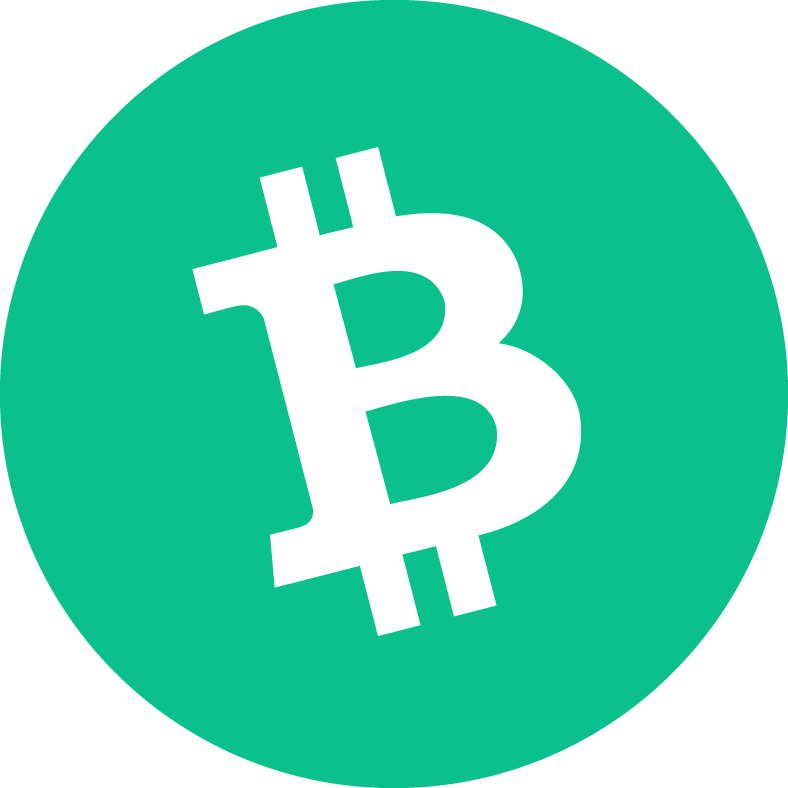During the first years of its operation, the Bitcoin (BTC) network was very fast and cheap to transact on. As the network became more popular and, thus, congested, transaction fees and confirmation times increased.
From its launch in 2009 to early 2017, Bitcoin’s average transaction fee stayed under $1 USD, being just a few cents in the earliest years of the network. In April 2017, the average fee cleared the $1 USD mark and never looked back.
In August 2017, a new fork of the original Bitcoin chain, Bitcoin Cash (BCH), emerged with the key aim of making transactions cheap and fast again.
What Is Bitcoin Cash (BCH)?
Bitcoin Cash (BCH) is a hard fork of the Bitcoin (BTC) blockchain, whose main distinction from its famous dad is the larger size of the transaction blocks processed by the network. While the standard size of each transaction block on Bitcoin is 1 MB, Bitcoin Cash allows blocks of up to 32 MB.
This makes it possible to fit more transactions per each processed block, which, in theory, should reduce the overall cost of transacting and make the network faster.
Bitcoin Cash was born out of an argument that flared up in the Bitcoin community in 2017 with regard to increasing the 1 MB block size limit. Some users and developers were frustrated with Bitcoin’s increasing costs and transaction confirmation times and saw the most logical solution in a block size increase.
However, the majority of the Bitcoin community was against the change as it meant modifying one of the most fundamental parameters of the network. Some users also believed that such a change would eventually have a limited effect on costs and transaction times.
The group that advocated for the limit change hard-forked the blockchain in August 2017, creating a new network called Bitcoin Cash.
Bitcoin Cash has positioned itself as a cheaper and faster alternative to Bitcoin for digital payments. The blockchain did achieve some of its goals while not living up to expectations with regard to some others.
Transaction fees have indeed become much cheaper than on Bitcoin. For example, over the last few weeks, the average transaction fee on Bitcoin has fluctuated between $4 and $6. On 8 May, the fee briefly spiked as high as $31. Over the same period, the average transaction fee on Bitcoin Cash has been fractions of a cent.
However, transaction confirmation times were not improved much, if at all. Both Bitcoin and Bitcoin Cash have typically had quite similar average transaction confirmation times of around 10 minutes.
This is because Bitcoin Cash has much lower hash power, defined as the collective resources dedicated to block mining on the network, compared to Bitcoin. Effectively, the advantage of the larger block sizes on Bitcoin Cash is cancelled out by the network’s much lower hash power, i.e., processing capacity.
Cryptocurrency of Bitcoin Cash
The cryptocurrency of Bitcoin Cash is BCH. Similar to the BTC coin, BCH is deflationary, with a maximum supply set at 21 million, exactly the same amount as for BTC. The coin’s current circulating supply runs at 19.4 million BCH.
BCH is among the major cryptocurrencies, with a market cap of around $2.2 billion, making it the 29th largest crypto.
In the past, BCH was among the most closely correlated cryptocurrencies with BTC. However, in more recent times, the correlation between the two cryptos has been less stable. In general, over the last year, BTC has delivered much better returns than BCH.
History and Team Behind Bitcoin Cash
When Bitcoin Cash split from the original Bitcoin network in August 2017, the key point of disagreement, the block size limit, was set at 8 MB. In May 2018, the limit was further raised to 32 MB.
Similar to BTC and ETH, BCH is a completely decentralised cryptocurrency. While some other major coins might have a decentralised mode of operation, many are owned by private companies. Such a centralised ownership mode means that if the owner company fails, the entire network and its crypto might be compromised. In the case of BCH and other cryptocurrencies with no centralised control, such risks are minimal.
BCH is among the cryptos with a large, well-established, and enthusiastic user and miner community of many thousands. This makes BCH a fairly secure cryptocurrency.
Among BCH’s most active supporters is a Swedish technology entrepreneur, Rick Falkvinge. Falkvinge jokingly referred to himself online as one of the CEOs of Bitcoin Cash. Another well-known Bitcoin Cash supporter is Roger Ver, a blockchain investor nicknamed “Bitcoin Jesus”.
Bitcoin Cash is a popular coin for crypto transactions thanks to its much lower network transaction costs compared to Bitcoin. In recent times, BCH has featured low or negative correlations with BTC. This hints at diversification potential for investors who would like to reduce their reliance on “Bitcoin-heavy” portfolios. The key advantage of Bitcoin Cash is that, similar to Bitcoin, it is free from centralised company control, making it unlikely to collapse as a result of a corporate failure. When investors seek to diversify their crypto portfolios, Bitcoin Cash could be a good candidate thanks to all these reasons.

